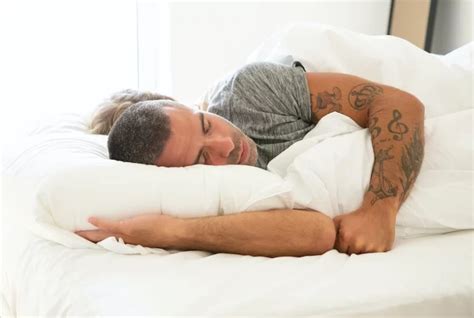How can men optimize sleep for peak cognitive function & recovery?

The Critical Link Between Sleep, Cognition, and Recovery for Men
In the relentless pace of modern life, sleep often becomes the first casualty, especially for men balancing demanding careers, family responsibilities, and personal fitness goals. However, viewing sleep as a luxury is a profound mistake. For men, optimized sleep is not just about feeling rested; it’s a fundamental pillar supporting peak cognitive function, robust physical recovery, hormonal balance, and overall mental resilience.
This article delves into the science and practical strategies men can employ to transform their sleep habits, unlocking their full potential in all aspects of life.

Why Sleep is Non-Negotiable for Men’s Performance
The impact of inadequate sleep extends far beyond simple grogginess. For men, chronic sleep deprivation can lead to a cascade of negative effects:
- Cognitive Decline: Reduced focus, impaired memory, slower reaction times, and diminished problem-solving abilities. Your brain literally cleanses itself during sleep, clearing metabolic waste that accumulates during waking hours.
- Impaired Physical Recovery: Sleep is when the body repairs muscle tissue, replenishes energy stores, and regulates inflammatory responses. Poor sleep directly hinders strength gains, endurance, and injury recovery.
- Hormonal Imbalance: Critical hormones like testosterone, growth hormone, and cortisol are predominantly regulated during sleep. Insufficient sleep can significantly lower testosterone levels, impacting mood, energy, libido, and muscle mass, while elevating stress hormones.
- Weakened Immune System: A well-rested body is better equipped to fight off infections and illnesses, keeping you healthier and more consistent in your routines.
- Mood & Mental Health: Sleep deprivation can exacerbate stress, anxiety, irritability, and even contribute to depressive symptoms, making emotional regulation more challenging.
Pillars of Optimal Sleep for Men
Achieving truly restorative sleep requires a holistic approach, focusing on several key areas:
1. Consistency is King
Your body thrives on routine. Going to bed and waking up at the same time every day, even on weekends, helps to regulate your circadian rhythm, your internal 24-hour clock. This consistency signals to your body when to release sleep-inducing hormones like melatonin and wakefulness-promoting hormones like cortisol.
2. Optimize Your Sleep Environment
Your bedroom should be a sanctuary for sleep. Focus on making it:
- Dark: Block out all light. Even small amounts of light can disrupt melatonin production. Consider blackout curtains or a sleep mask.
- Cool: The ideal sleep temperature is typically between 60-67°F (15-19°C). A slightly cooler room helps your body achieve and maintain core temperature drops necessary for deep sleep.
- Quiet: Minimize noise distractions. Earplugs or a white noise machine can be beneficial, especially if you live in a noisy environment.
- Comfortable: Invest in a good quality mattress and pillows that support your preferred sleeping position.

3. Develop a Powerful Pre-Sleep Routine
Just as you have a wake-up routine, an hour or so before bed, start winding down:
- Avoid Screens: The blue light emitted by phones, tablets, and computers suppresses melatonin production. Put devices away at least 60-90 minutes before bed.
- Relaxation Techniques: Engage in calming activities like reading a physical book, taking a warm bath or shower, listening to mellow music, light stretching, or meditation.
- Dim the Lights: Signal to your brain that it’s time to prepare for sleep by lowering light levels around your home.

4. Diet, Exercise, and Hydration
- Mind Your Intake: Avoid heavy meals, excessive alcohol, and caffeine too close to bedtime. Caffeine has a long half-life, so cut it off 6-8 hours before sleep. Alcohol might make you drowsy but disrupts sleep architecture, leading to fragmented sleep.
- Regular Exercise: Consistent physical activity can significantly improve sleep quality. However, strenuous workouts too close to bedtime can be stimulating. Aim to finish intense exercise at least 3-4 hours before sleep.
- Hydration: Stay well-hydrated throughout the day, but reduce fluid intake in the hour or two before bed to minimize nighttime bathroom trips.

5. Master Stress Management
Stress and anxiety are notorious sleep disruptors. For men, who often internalize stress, developing effective coping mechanisms is crucial:
- Mindfulness & Meditation: Even 10-15 minutes a day can reduce cortisol levels and calm an overactive mind.
- Journaling: Writing down your thoughts and concerns before bed can help clear your mind.
- Problem-Solving Time: Designate a specific ‘worry time’ earlier in the day to address issues, so they don’t hijack your bedtime.
When to Seek Professional Help
If despite implementing these strategies, you consistently struggle with sleep, experience excessive daytime fatigue, or suspect an underlying condition, don’t hesitate to consult a healthcare professional. Conditions like sleep apnea, restless leg syndrome, or chronic insomnia require medical diagnosis and treatment.

Conclusion: Reclaim Your Sleep, Reclaim Your Peak
Optimizing sleep is one of the most powerful, yet often overlooked, levers men have for enhancing cognitive function, accelerating physical recovery, and improving overall well-being. It requires commitment and consistency, but the dividends it pays in increased energy, sharper focus, better mood, and a more resilient body are immeasurable. By prioritizing sleep and implementing these actionable strategies, men can not only meet life’s demands but truly thrive.









